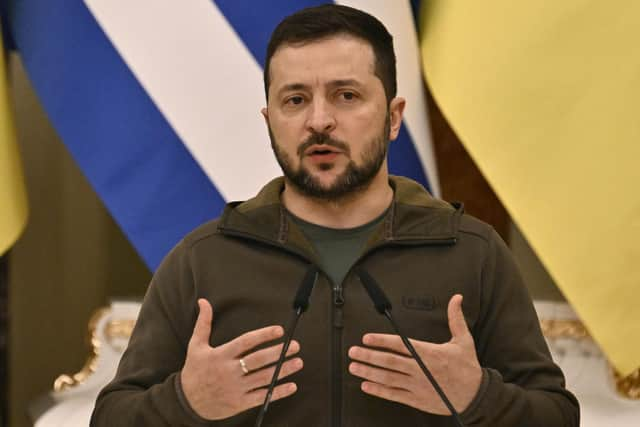Eurovision 2023: Rishi Sunak 'disappointed' Volodymyr Zelensky blocked from address at Eurovision final
Rishi Sunak is "disappointed" by the decision of the European Broadcasting Union (EBU) to block Ukraine's President Volodymyr Zelensky from addressing the grand final of the Eurovision Song Contest.
The body, which produces the event, said on Thursday night it had declined Mr Zelensky's request to speak on Saturday over fears it could politicise the contest.
Advertisement
Hide AdAdvertisement
Hide AdHe had wanted to make an unannounced video appearance and had been expected to implore the global audience of millions to continue backing his country in its fight to repel Russian invaders.


The EBU said Mr Zelensky had "laudable intentions", but "regrettably" his request was against the rules.
On Friday, the Prime Minister's official spokesman said: "The Prime Minister believes it would be fitting for President Zelensky to address the event and we're disappointed by the decision from the European Broadcasting Union.
"The values and freedoms that President Zelensky and the people of Ukraine are fighting for are not political, they're fundamental, and Eurovision themselves recognised that last year when they rightly suspended Russia's participation from the competition."
There are no plans to intervene and ask organisers to change their mind, Downing Street suggested.


In its statement on Thursday, the EBU noted 11 Ukrainian artists, including last year's winners Kalush Orchestra, are performing and 37 locations from around Ukraine are being shown.
The BBC has said the broadcast of this year's contest is expected to be watched by more than 160 million viewers worldwide.
On Friday, BBC Eurovision commentators Rylan Clark and Scott Mills stressed the contest was non-political.
Advertisement
Hide AdAdvertisement
Hide AdClark said: "At the end of the day we are commentators, so we don't get involved in show format. I just think Eurovision, people say it is political – votes here, votes there.
"From being on the inside it is the least political experience you could ever have, actually."
Radio DJ Mills added: "People always ask, 'Do you think it is political?'. It really isn't. It is a song contest."
Clark continued: "It is a song contest and that is what we are here to say."
The pair, who provided TV commentary for the two semi-finals this week and will host radio coverage of the grand final, also stressed that as last year's winner, Ukraine and its culture were being celebrated across Liverpool throughout the event.
Clark said: "Ukraine, this is their party in our country."
"We always said that we would be true to that because they were the winner and I think it is very visible in the city," added Mills.
They spoke at the British Music Experience on the Liverpool waterfront, where Zoe Ball hosted a special edition of her BBC Radio 2 breakfast show, which featured guests including last year's UK entrant Sam Ryder and The Fizz, featuring members of former Eurovision winners Bucks Fizz.
Kalush Orchestra won last year's contest, but owing to the Russian invasion of the country, hosting duties were awarded to the runner-up, the UK.
Advertisement
Hide AdAdvertisement
Hide AdMr Zelensky said earlier this week he would have preferred Eurovision to take place in a neighbouring country.
Speaking to the BBC, he said: "I have great respect for the United Kingdom and its society. It is an amazing country.
"From the very start my opinion has been that if we can't host Eurovision it should take place in one of the countries that share a border with us, such as Slovakia, Poland or any other country which our people can reach easily. Something nearby."
Comments
Want to join the conversation? Please or to comment on this article.